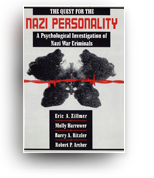 |

Open to Interpretation…The Art and Science of Inkblots
Ashland, OH: Hogrefe, 2009
[more]
............................................
Principles of Neuropsychology
Belmont, CA: Wadsworth, 2008
[more]
............................................
Military Psychology: Clinical and Operational Applications
New York, NY: Guilford, 2006
[more]
............................................
The Quest for
the Nazi Personality
Hillsdale, NJ: Lawrence Erlbaum Associates, 1995
............................................
Neuropsychological Assessment and Intervention
Springfield, IL: Charles Thomas, 1992
[more]
|
 |
|
 |
 |
 |
THE QUEST FOR THE NAZI PERSONALITY:
A Psychological Investigation of Nazi War Criminals

Eric A. Zillmer, Molly Harrower, Barry A. Ritzler, & Robert P. Archer
Hillsdale, NJ: Lawrence Erlbaum Associates, 1995
|

Coming back to the over 200 Nazi protocols you analyzed. What were your findings and what does this mean for the future?
The term "Nazi" implies the existence of a cohesive Nazi personality. But our results did not confirm the stereotype that the Nazis had a uniform personality or were psychotic monsters. While a majority of the Nazi protocols demonstrated unusual thought patterns, only very few Nazi records can be described as psychotic, bizarre, or severely disturbed. Nevertheless, there was evidence in a majority of the records that suggested a propensity for interpreting one's surroundings in a highly simplistic and often unconventional fashion.
Next Question...
|
|